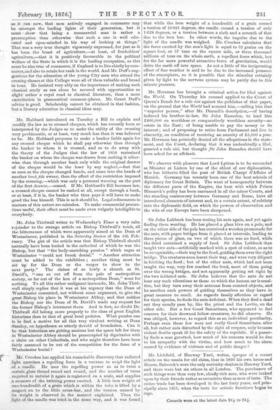Mr. John Thirlwall writes to Wednesday's Times a very calm
rejoinder to the strange article on Bishop Thirlwall's tomb, all the bitternesses of which were apparently aimed at the Dean of Westminster, published in the Saturday Review of the 5th Feb- ruary. The gist of the article was that Bishop Thirlwall should naturally have been buried in the cathedral of which he was the Bishop, but that "the body-snatching passion" which rages at Westminster "could not brook deniaL" "Another attraction must be added to the exhibition ; another thing must be set up for the Dean or the verger to show to the next party." The claims of so lowly a church as St. David's, "one so cut off from the pale of metropolitan society, so fax out of the ken of a metropolitan Dean," went for nothing. To all this rather malignant innuendo, Mr. John Thirl- wall simply replies that it was at his urgency that the Dean of Westminster consented, not without some argument, to give the great Bishop his place in Westminster Abbey, and that neither the Bishop nor the Dean of St. David's made any request for the former Bishop's interment there. And in fact, no doubt Dr. Thirlwall did belong more properly to the class of great English historians than to that of greal local prelates. What puzzles one is to find a motive for all this very virulent writing at Dean Stanley, on hypotheses so utterly devoid of foundation. Can it be that historians are getting anxious lest the space left for them in Westminster Abbey should be preoccupied by dignitaries with a claim on other Cathedrals, and who might therefore have been fairly assumed to be out of the competition for the fame of a Westminster burial?


































 Previous page
Previous page